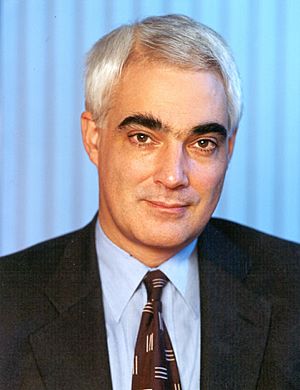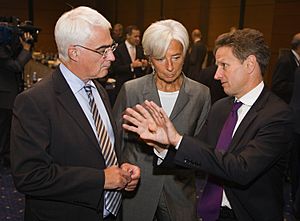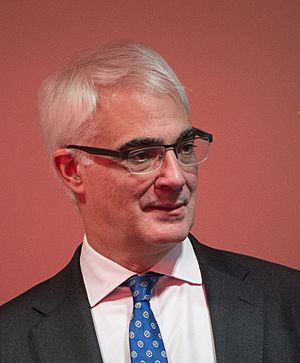Alistair Darling facts for kids
Quick facts for kids
The Lord Darling of Roulanish
|
|||||||||||||||||||||||||
|---|---|---|---|---|---|---|---|---|---|---|---|---|---|---|---|---|---|---|---|---|---|---|---|---|---|

Official portrait, 2007
|
|||||||||||||||||||||||||
| Chancellor of the Exchequer | |||||||||||||||||||||||||
| In office 28 June 2007 – 11 May 2010 |
|||||||||||||||||||||||||
| Prime Minister | Gordon Brown | ||||||||||||||||||||||||
| Preceded by | Gordon Brown | ||||||||||||||||||||||||
| Succeeded by | George Osborne | ||||||||||||||||||||||||
| Secretary of State for Trade and Industry President of the Board of Trade |
|||||||||||||||||||||||||
| In office 5 May 2006 – 27 June 2007 |
|||||||||||||||||||||||||
| Prime Minister | Tony Blair | ||||||||||||||||||||||||
| Preceded by | Alan Johnson | ||||||||||||||||||||||||
| Succeeded by | John Hutton (Business, Enterprise and Regulatory Reform) | ||||||||||||||||||||||||
| Secretary of State for Scotland | |||||||||||||||||||||||||
| In office 13 June 2003 – 5 May 2006 |
|||||||||||||||||||||||||
| Prime Minister | Tony Blair | ||||||||||||||||||||||||
| Preceded by | Helen Liddell | ||||||||||||||||||||||||
| Succeeded by | Douglas Alexander | ||||||||||||||||||||||||
| Secretary of State for Transport | |||||||||||||||||||||||||
| In office 29 May 2002 – 5 May 2006 |
|||||||||||||||||||||||||
| Prime Minister | Tony Blair | ||||||||||||||||||||||||
| Preceded by | Stephen Byers (Transport, Local Government and the Regions) | ||||||||||||||||||||||||
| Succeeded by | Douglas Alexander | ||||||||||||||||||||||||
| Secretary of State for Work and Pensions | |||||||||||||||||||||||||
| In office 27 July 1998 – 29 May 2002 |
|||||||||||||||||||||||||
| Prime Minister | Tony Blair | ||||||||||||||||||||||||
| Preceded by | Harriet Harman | ||||||||||||||||||||||||
| Succeeded by | Andrew Smith | ||||||||||||||||||||||||
| Chief Secretary to the Treasury | |||||||||||||||||||||||||
| In office 3 May 1997 – 27 July 1998 |
|||||||||||||||||||||||||
| Prime Minister | Tony Blair | ||||||||||||||||||||||||
| Preceded by | William Waldegrave | ||||||||||||||||||||||||
| Succeeded by | Stephen Byers | ||||||||||||||||||||||||
|
|||||||||||||||||||||||||
|
|||||||||||||||||||||||||
| Personal details | |||||||||||||||||||||||||
| Born |
Alistair Maclean Darling
28 November 1953 Hendon, Middlesex, England |
||||||||||||||||||||||||
| Died | 30 November 2023 (aged 70) Edinburgh, Scotland |
||||||||||||||||||||||||
| Political party | Labour | ||||||||||||||||||||||||
| Spouse |
Margaret Vaughan
(m. 1986) |
||||||||||||||||||||||||
| Children | 2 | ||||||||||||||||||||||||
| Alma mater | University of Aberdeen | ||||||||||||||||||||||||
| Signature | |||||||||||||||||||||||||
Alistair Maclean Darling, Baron Darling of Roulanish (28 November 1953 – 30 November 2023) was an important British politician. He was a member of the Labour Party. From 2007 to 2010, he served as Chancellor of the Exchequer under Prime Minister Gordon Brown. This role is like being the country's chief financial manager.
Darling was also a Member of Parliament (MP) for 28 years. He represented areas in Edinburgh from 1987 to 2015. Before becoming Chancellor, he held several other important government jobs. He was a key figure during the financial crisis of 2007–2008. Later, he led the campaign for Scotland to remain part of the United Kingdom.
Contents
Alistair Darling's Early Life and Career
Alistair Darling was born in London, England, on November 28, 1953. His father was a civil engineer. Alistair went to school in Surrey and Scotland. He then studied law at the University of Aberdeen. He became the president of the university's student council.
In 1977, at age 23, Darling joined the Labour Party. He first worked as a solicitor and then as an advocate. In 1982, he was elected to the Lothian Regional Council. This was a local government body. He served on the council until he became an MP.
Becoming a Member of Parliament
Darling became a Member of Parliament (MP) in 1987. He won the election for the Edinburgh Central area. An MP is a person elected to represent a group of people in the national parliament. He continued to be an MP for Edinburgh for 28 years.
Later, his constituency changed to Edinburgh South West. He worked hard to represent his local area. Even when he was a senior government minister, he focused on his constituents.
Working in the Shadow Cabinet
Before his party won the election, Darling was part of the Shadow Cabinet. This is a group of senior politicians from the main opposition party. They act as a "shadow government," watching over the actual government's departments. Darling was the Shadow Chief Secretary to the Treasury in 1996.
Alistair Darling in Government
When the Labour Party won the general election in 1997, Alistair Darling joined the government. He became a member of the Cabinet. The Cabinet is a group of the most important ministers chosen by the Prime Minister.
His first Cabinet job was Chief Secretary to the Treasury. This role helps manage the country's money. In 1998, he became Secretary of State for Work and Pensions. This department handles things like benefits and employment.
From 2002 to 2006, Darling was the Secretary of State for Transport. He was in charge of the country's transport systems. He helped create Network Rail, which manages train tracks. He also supported the Crossrail project, a big new railway line under London.
In 2003, he also became Secretary of State for Scotland. This meant he looked after Scottish affairs within the UK government. In 2006, he moved to become Secretary of State for Trade and Industry. This role focused on business and trade rules.
Chancellor of the Exchequer
In June 2007, Gordon Brown became Prime Minister. He chose Alistair Darling to be the new Chancellor of the Exchequer. This is one of the most powerful jobs in the government, responsible for the country's economy.
Darling served as Chancellor during a very difficult time. The world faced a major financial crisis in 2007-2008. This crisis affected banks and economies globally. Darling had to make big decisions to help the UK economy. For example, he helped to support Northern Rock, a British bank that faced problems. He also helped with a plan to support other banks in 2008.
Government Budgets
As Chancellor, Darling presented the government's annual Budget. This is a plan for how the government will raise and spend money.
- In his 2009 Budget, he announced a special payment to encourage people to trade in old cars for new ones. He also introduced a higher tax rate for people earning a lot of money.
- His final Budget was in March 2010, just before a general election.
Economic Challenges
In 2008, Darling warned that the economic times were "arguably the worst they've been in 60 years." He believed it would be a long-lasting problem. He later said that the country was very close to a major breakdown if banks had not been helped.
One challenge he faced was about a change to income tax. An earlier change meant some low-income workers would pay more tax. Darling announced a plan to help these workers by increasing a tax-free allowance.
Later Activities
After the Labour Party lost the 2010 general election, Alistair Darling decided to step down from his senior political role. He returned to being a regular MP.
Expenses Claims
In 2009, there were questions about some of Darling's expenses claims as an MP. He said that his claims followed the rules. He later apologized for one mistaken claim and repaid £700.
Better Together Campaign
From 2012 to 2014, Darling led the Better Together campaign. This group wanted Scotland to remain part of the United Kingdom. He played a big role in the 2014 Scottish independence referendum. He took part in televised debates against Alex Salmond, who was the First Minister of Scotland and supported independence. The "No" vote, which Darling supported, won the referendum.
Joining the House of Lords
In 2015, Alistair Darling was given a life peerage. This meant he became a member of the House of Lords. The House of Lords is the second chamber of the UK Parliament. He was known as Baron Darling of Roulanish. He retired from the House of Lords in 2020.
Personal Life
Alistair Darling was married to Margaret McQueen Vaughan from 1986 until his death. They had two children, a son named Calum and a daughter named Anna. Margaret Vaughan used to be a journalist. Darling enjoyed listening to music from bands like Pink Floyd and Coldplay.
Death
Alistair Darling died from cancer on November 30, 2023, in Edinburgh. He was 70 years old. Many important political figures, including former Prime Minister Gordon Brown, paid tribute to him.
Images for kids
See also
 In Spanish: Alistair Darling para niños
In Spanish: Alistair Darling para niños
 | George Robert Carruthers |
 | Patricia Bath |
 | Jan Ernst Matzeliger |
 | Alexander Miles |



